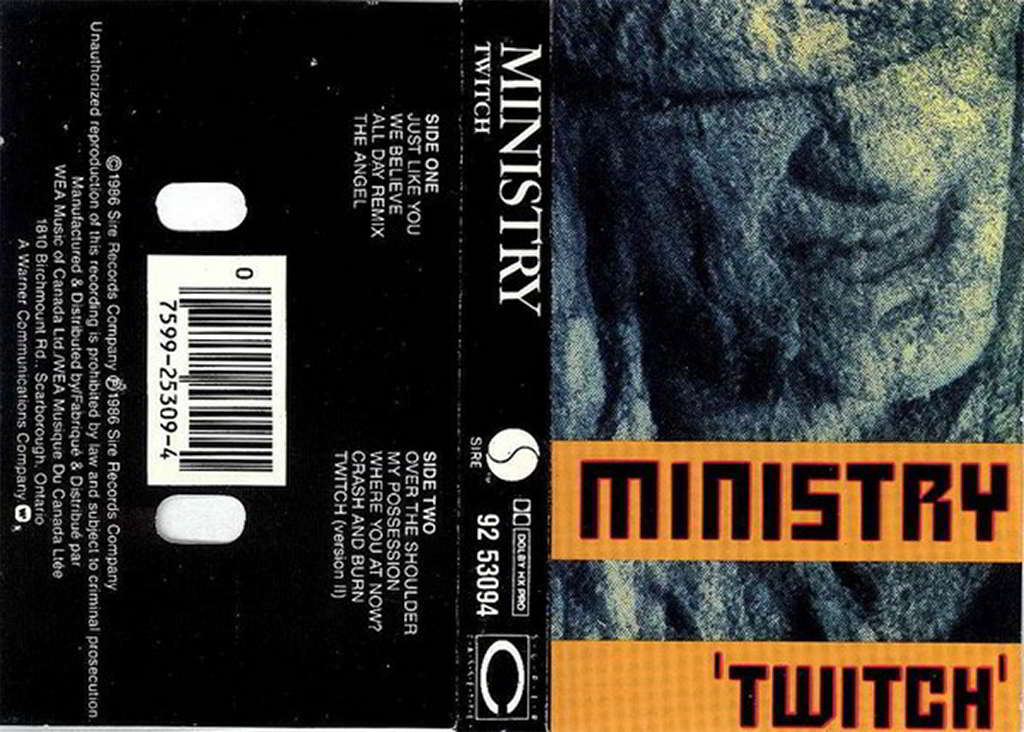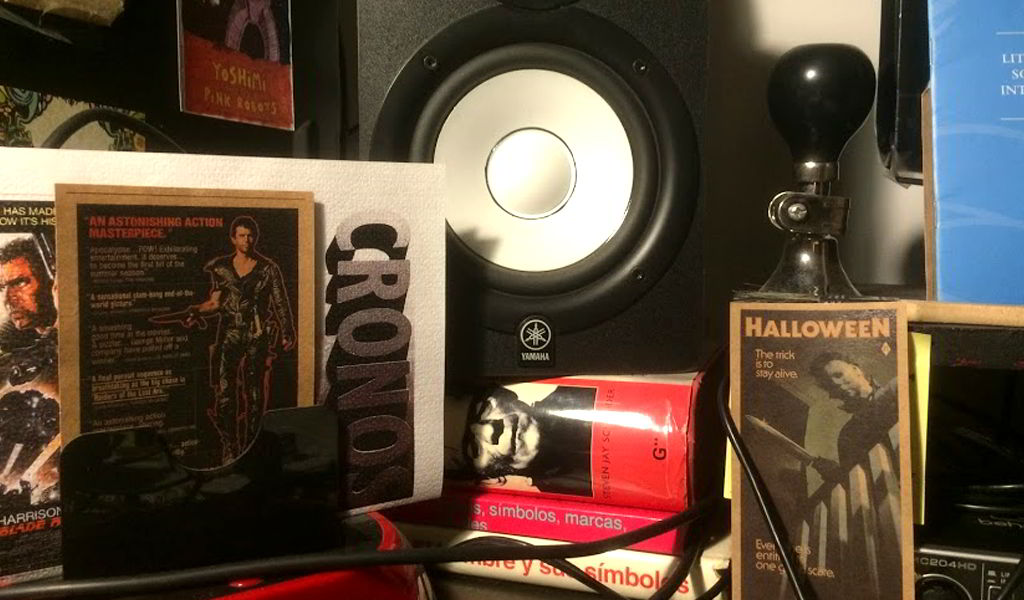A few days ago, in the middle of the quarantine infoxication, I made a comment in a colleague’s post indicating how much I liked the recommended album.
Social networks are the hypothesis made real by Foucault’s microphysics of power. That every part of your body will be watched, is real from where we make the approach and approach. The social networks confirm this, we give the authorization for this surveillance, besides we do it gladly anxiously.
The talk begins with a personal message, at eleven o’clock at night, in Argentina. Lorenzo writes and tells me that after seeing my comment in that publication he asked himself why I liked that album so much, something that, on the contrary, he didn’t think it was so good and didn’t like it either, that in fact the Ministry’s career seemed better to him after that second album, TWITCH, but that he didn’t find it “magic“, “good” or “interesting“. Lorenzo wanted to know, appealing to my function as an iterative “listener”, what is it that calls my attention in all that he does not find.
We’re talking about Ministry’s TWITCH , the first one after the first one, With Sympathy.. In this album, according to the information that there is in the dispersed web, is where the band moves away from the style with which it had debuted, the synthpop and begins to deepen in its industrial metal.
We are not going to make a review of an excessively reviewed album, that is not the idea. The idea is to talk about the way we listen.
The phenomenon of The Listening, so mentioned these days, we see it being approached in only two ways: One with socio-political and academic overtones, the other from a technical academic point of view.
Listening as a PRIVATE element
I answer Lorenzo via text, I don’t like voice mails, or having them sent to me, and I don’t have to record them.
I know that it is a very useful tool in certain contexts, for example, in the production of The Noise is the Message, I appeal to these voice messages to get answers to questionnaires, interviews, audios of sound environments, etc.
It is also useful when I think I can multi-task, listen and hold a conversation while, for example, tidying up the bedroom or preparing lunch.
The point is that you “think you can…” but in reality you can’t, you can’t attend to the message or talk, because you need critical attention to an “acousmatic voice”.
The forms of communication that we currently use where devices (telephone sets), virtual space (the digital network) and our physical environment with the assigned occupation, ordering, cooking, etc, deform that acoustic voice.
Voices, I hear Voices…
How would we interpret the term acoustic voice? No more than that in which a sound is heard without being able to recognize its source. When we hear a sound, we have the natural impulse to want to know its concrete origin, therefore we resort to our accumulation of knowledge to immediately identify the generating source, our brain automatically defines, classifies, labels and tells us what it is.
The Acoustic Voice could be more clearly the Voice Processed by the devices. Listening to the audio of another person, generated from miles away, processed by a technological device, which synthesizes the sound wave to “optimize” and deconstruct it so that it can then be transported through a “virtual” network and reconstructed in another device that both optimizes the information received and converts it back into a sound wave. It seems simple, but it is to be able to see the flow of the signal in a process diagram to understand what happens with this path to understand the approximation of the term acoustic voice.
Personal Motivation
I like TWITCH for personal reasons. When I first heard Ministry in 2000, I listened to records from the 90’s and I wasn’t really interested in their proposal. It took about 10 years for him to resume listening and it was almost the same disappointment again, despite all the metal and industrial stuff he had consumed in the meantime.
2010 was not the year for this band either. Almost 10 years later, in 2018 and while I was arranging my things to move to Santiago, Chile, one afternoon-night of oppressive and asphyxiating humid heat, from the city of Rosario in Argentina, another friend, Claudio, recommended me, as a palliative to the heat, to listen to this album in question: TWITCH, from Ministry.
Good beers, nice company, humid heat and space, a small balcony with plants, two cats and boxes with books, records and kitchen items, was the environment to enter TWITCH.
And there, for me, his listening seemed another, much warmer, interestingly intense. I listened to this album many times and it always produces the same thing. I don’t feel it’s a great album, it’s an exploration, a transition, like Achtung Baby by U2, US by Peter Gabriel or I’ll Communication by Beastie Boys. Transitions, tests and search with different results. With all that, with this load of imperfection and dirt, I like the album.
Twitch as the successor of With Sympathy is a hybrid thing, unhinged, with Metal, Hardcore, Industrial, Post Punk, Experimental, unpolished and dirty. I guess the fans of the first album must have wanted to kill themselves listening to that as much as the fans of Judas Priest when they read that their leader, Rob Halford assumes his out off closet in 98′.
But here comes the concern. The ways of listening that we have when we deal with LISTENING.
When in a few lines I mentioned the social, political and academic aspect of how the exercise of listening is approached I refer to that attentive listening in which phenomena such as the auditory contamination of the urban in the face of the sound environment, the ways of perceiving the sound object, etc. are analyzed.
In the technical aspect, we are inundated with physical laws, technical elements and technological devices, headphones, vinyls, cassettes, compacters, digital vs. analog, decibels, kbps, hi-fi, low-fi, etc.
Where do we locate Emotional Listening, in What Context?
 Ministry – Twitch | Cassette – Fuente: Discogs
Ministry – Twitch | Cassette – Fuente: Discogs
The emotional state does not seem to enter into the socio-political aspect and neither does the technical one. What we get from listening to a sound or a set of sounds and silences in a certain environment, on a hot afternoon, among friends and with a couple of beers, does not seem to influence “the ways of listening“.
Listening to TWITCH takes me back to a pleasant and pleasant afternoon of chatting, under the recommendation of someone who is not an unconditional fan of this band either, perhaps only of this album. This is how this argument is based.
When I sit down to listen to music, I need to place it in a pleasant emotional context so that it is fluid, to be able to give it the extra pleasure so that it returns in any context and at any moment to remit that experience. Of course it won’t always be “the same” because contexts change like we change socks in a week of cool autumn in a forced quarantine.
Talks about tastes never end, they are always taken up again and always improve the listening aspects.
One anecdote adds to another, improves the pleasure of what is heard, modifies the “where” and also clarifies the “why” since it is always the “when” that marks or delimits a “how“.
- The HOW is the device we access to establish.
- The WHERE is our physical space.
- The WHEN is the temporal moment.
- The WHY is the situation that merits your listening.
- The WHAT… at that moment, was the Ministry TWITCH.
In the same way as a tongue twister, emotional listening empowers us with possibilities and references that perhaps, many times, we miss.

